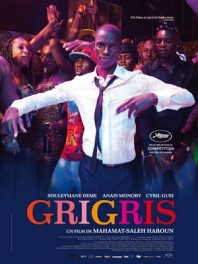
Title: GRIGRIS (Full Story)
Starring: Souleymane Deme, Anais Monory, Cyril Guei
Synopsis:
A young man with a paralyzed leg has dreams of becoming a professional dancer but must put his goals aside to care for his ailing stepfather.
Trailer courtesy of Fresh Movie Trailers
Review:
“Grigris” is a French/Chadian film with English subtitles. It follows Grigris (Souleymane Deme), who is a young guy with a disabled leg. Grigris won’t allow his disability to hinder him from living a normal life or pursuing his dreams. He’s actually pretty flexible and dances for money at a local club on the weekends. During the day he helped his stepfather run a photography studio.
The studio is where he met Mimi (Anais Monory) for the first time. She had dreams of becoming a model and hired Grigris to take photos of her. Not much came of their initial meeting but Grigris ran into her again at the club where he danced. He was attracted to her and the two became acquainted but Grigris was unaware that she was a prostitute.
When Grigris’ stepfather became ill it marked the changes that Grigris would soon encounter. The hospital required a huge sum of money for his step dad’s medical care. In an effort to raise money, Grigris joined a petrol smuggling ring.
The job required him to swim across the river with jelly cans attached to his back but his paralyzed leg caused him to fail on his first attempt. Grigris was then given the opportunity to drive instead of swim and he soon became a reliable source for Moussa (Cyril Guei), the bigwig of the ring.
Conflict entered the story when Grigris stole a shipment of fuel. When he faced Moussa he claimed the police confiscated it. With self-inflicted bruises he hoped it would make his story believable. Moussa had misgivings about the whereabouts of his shipment and he threatened to kill Grigris if he didn’t return the fuel within two days.
Let’s Talk. The word grigris refers to good luck but Grigris’ life was anything but. From his paralyzed leg, to his ailing stepfather, and his shortage of funds, life for Grigris was indeed challenging. Even when he found love, the woman he fell for turned out to be a prostitute.
The screenplay is loaded with simplistic dialogue and the story leaves a lot to be desired. The writer planted a few seeds along the journey that never materialized. For instance, Moussa made Grigris swear on the Qur’an that he’s telling the truth about the missing petrol. He warned Grigris that if he committed perjury that he would suffer damnation. This left an opening for more heartache for Grigris yet he was never punished for the crime.
It’s difficult to sympathize with Grigris because he raised enough money for his stepfather’s hospital expenses so his decision to steal was unfounded. The story fails to display what made him go that route and better yet what made him think he could outsmart his crime boss.
The fact that he would steal from the very person that gave him an opportunity to make money when he desperately needed to (legal or not), creates resistance in rooting for the protagonist of the story.
The story concluded with the possibility that Moussa could still seek revenge against Grigris. Both characters were still alive at the end and the stolen fuel had not surfaced, so this presented another loose end in the story.
The romance between Mimi and Grigris lacked spark. They appeared to be two people that were together based on need, not desire. Mimi had no choice but to run away with Grigris. She had slept with most of the men in town and nobody else wanted her. She even wound up pregnant and didn’t know who the father was.
On an up note, the screenplay is educational in that it exposed the fuel trafficking problem that exists in the country. It also illustrated that there is power in numbers such as when the town villagers banned together to protect Grigris against his enemies.
The highlight of the movie, of course, was watching Souleymane Deme dance. He has incredible agility and his dance moves were electrifying.
Unfortunately, “Grigris” isn’t a thorough screenplay. The underdeveloped characters and mediocre acting undermined its chance of being another signature production for Director Mahamat Saleh Haroun. EJECT
- Rated: Not Rated
- Genre: Drama
- Release Date: 2013
- Directed by: Mahamat Saleh Haroun
- Starring: Souleymane Deme, Anais Monory, Marion Yelolo, Abakar M’Bairo, Cyril Guei, Youssouf Djaoro
- Written by: Mahamat Saleh Haroun
- Studio: Pili Films
- Country: Chad





